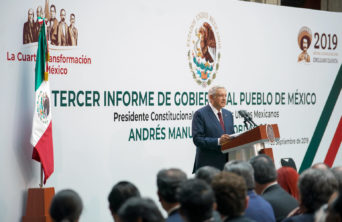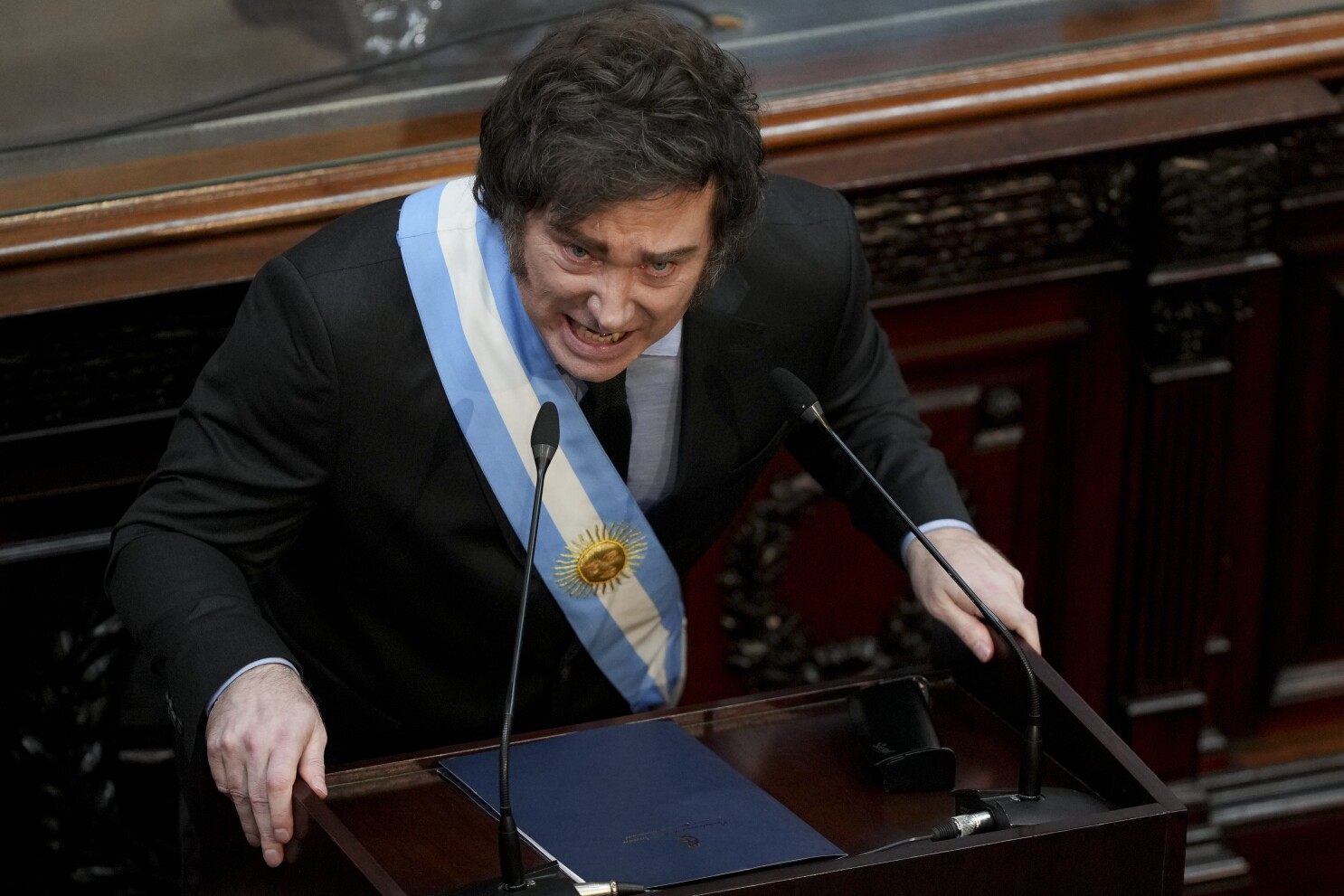 Mexican President Andrés Manuel López Obrador delivered his first state of the union address on September 1 from a position of strength. A little over a year since he swept the presidential election with 53% of the vote, he boasts strong majorities in both houses of congress and his approval rating stands between 60 and 70 percent– among the highest for any head of state in the democratic world. The opposition parties are in disarray, plagued by internal conflicts in the run-up to intermediate elections in 2021.
Mexican President Andrés Manuel López Obrador delivered his first state of the union address on September 1 from a position of strength. A little over a year since he swept the presidential election with 53% of the vote, he boasts strong majorities in both houses of congress and his approval rating stands between 60 and 70 percent– among the highest for any head of state in the democratic world. The opposition parties are in disarray, plagued by internal conflicts in the run-up to intermediate elections in 2021.
López Obrador remains popular in spite of the fact that the first nine months in office have failed to produce results in several key areas, including violence rates and economic growth. For now, the president can keep blaming those lingering problems on his predecessors from the neoliberal period, which he claims ended on March 17, 2019. But that will become less convincing as the first anniversary of his inauguration approaches.
The media had a predictable response to the president’s speech, with outlets on the left of the spectrum offering cautious optimism about the future of the country, and those on the right warning about creeping authoritarianism and economic ruin. The editorial board of the left-wing daily La Jornada offered a generally positive evaluation of López Obrador’s speech and his presidency, noting that while his execution of social policies has been “far from perfect, and has run into many obstacles, distortions and insufficiencies, it’s hard to claim that, as a whole, these programs don’t mark a clear difference with the governments of the neoliberal cycle.” Conservative commentators blamed the president for the weak economy and violence, and criticized his use of power.
Meanwhile, the President López Obrador continues to struggle to connect his radical discourse to coherent policy programs, a contradiction that is becoming clearer as his mandate continues. In areas such as migration and security, bold, abstract proposals have come in conflict with difficult political realities, often creating policies that look suspiciously like those of his predecessors.
Security, the “main challenge”
In his speech, the president pointed to violence and insecurity as his “main challenge.” He strongly asserted that security policy has undergone a radical change with his administration, that the strategy of frontal assault on organized crime has definitively ended, and that “the state is no longer the main violator of human rights.”
At the same time, he admitted that his policies “have not had good results in terms of reducing crime rates.”
Indeed, homicide numbers have risen in the first nine months of López Obrador’s government, with more people dying violent deaths in the first half of 2019 than in the same period in at least 22 years, including the bloodiest months of the administrations of Felipe Calderón and Enrique Peña Nieto.
On security issues, the president has a good argument for blaming bad results on his predecessors. The security model applied by the PRI and PAN and supported by the United States through the Mérida Initiative has resulted in more than 250,000 murders and executions over the past twelve years, fostering patterns of violence that have continued after López Obrador took office and led to the more than 20,000 violent deaths that have taken place on his watch.
López Obrador vowed to change that model, promising to end military cooperation with the United States, move away from a prohibitionist drug policy and address the root causes of crime.
In his state of the union address, the Mexican president said that his government has already initiated a “paradigm change in security,” scaling down the use of police and military actions to fight violence.
“With the conviction that violence creates more violence, this government decided to abandon measures of war and take up an integral policy of justice, peace and citizen security,” he said.
But the most important step President López Obrador has taken on security policy is the creation of the National Guard, a militarized police force run by Brigadier General Luis Rodriguez, with a new legal framework for armed forces in domestic law enforcement. Congress placed some limitations on the involvement of the armed forces in the Guard, and the new security force is subject to civilian command through the newly formed Secretariat of Citizen Security and Protection. But the National Guard policy shows more continuity than rupture with the security policy of López Obrador’s predecessors, according to Carlos Ventura, general coordinator of the Vitoria Human Rights Center.
“There’s not much novelty in his security model compared with that of previous administrations,” Ventura said in an interview with the Americas Program. “In practical terms, the National Guard doesn’t have a different focus than that of the previous governments. In this case, it’s continuity related to the use of the armed forces for public security work, which we have constantly denounced as a process of militarization.”
A Turnaround on Migration Policy
One of the first high-profile actions of the National Guard was its deployment to the borders for migration enforcement in July. The one-sided agreement with the Trump administration allowed Mexico to avoid the implementation of export tariffs, but was not part of any policy program for migration.
López Obrador praised the agreement in his speech, although he noted that it obligates his government to carry out stricter immigration enforcement than it would otherwise be inclined to do. The crackdown contradicts the president’s humanitarian rhetoric on migration early in his term. Dr. Leticia Calderón, immigration analyst at the Mora Institute in Mexico City, claims that the reversal came about as a result of US pressure, but also because López Obrador never had a coherent policy proposal for immigration enforcement.
“We need to remember that López Obrador is not very familiar with migration, it was never an issue he followed or was very interested in,” she told the Americas Program. “He adapted his rhetoric according to what his advisers told him, and he had a more humanitarian rhetoric, compared with previous governments. But then, reality imposed itself, and the reality was that Mexico borders the United States, and there was a lot of pressure shortly after the government changed.”
Economy–Slow Growth, Low Inflation, High Surplus
López Obrador struggled to present an optimistic forecast for the economy, admitting that although not in a recession, Mexico faces slower than expected GDP growth. According to Mexico’s national statistics agency (Inegi) the GDP contracted 0.3 percent in the first quarter of 2019, and remained flat in the second.
But López Obrador questioned the use of GDP as the principal economic indicator, criticizing what he called “the technocratic obsession to measure everything in terms of simple economic growth.”
“Economic growth, and increases in productivity and competitiveness don’t make sense as goals in and of themselves, but rather as tools to achieve a greater goal: the general wellbeing of the population,” he noted in his address.
To offer a more optimistic outlook on the economy, he cited various positive indicators from the second quarter, including the lowest level of inflation since December 2016, a halt in the decline in petroleum production for the first time in 14 years, and a current account surplus of over US $5 billion, by far the largest surplus on record.
He also claimed that wealth and income inequality have gone down, offering a variety of indicators to prove it, including an increase in tax collection of 2.6 percent in 2019, and cuts to wages and benefits for high-ranking officials that have saved 145 million pesos since he took office. He also pointed to a reorientation of spending on social programs, a minimum wage hike of 16 percent in the first month of his presidency and a record-high average wage of 11,580 pesos a month for workers in the formal sector.
President López Obrador restated his conviction that part of his role as president is to create a more equitable society.
“We have left neoliberal hypocrisy behind and we recognize that the role of the state is to reduce social inequality,” he said. “Only with a just society will we achieve the rebirth of Mexico.”



